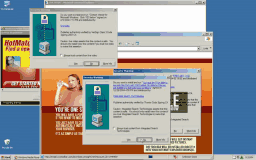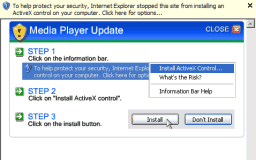Interesting too to see how they plan to market it. Will it be free? Free for home use?
Sold as part of a service? Fully commercial? I don’t know and, it seems, neither
does Microsoft yet.
Unfortunately, they’re damned either way. If they make it free, they’ll
be castigated for “leveraging their monopoly into another market”, competing
unfairly with the other parasite removal software companies. If they try to charge for it,
they’ll be “demanding money to solve a problem they caused in the first
place”.
Meanwhile, some people will be cautious of giving Microsoft even more control over
what is allowed to run on a Windows box, and the parasite vendors are going to be very
cross (bless ’em). When it was just XYZ Tinpot Spyware Remover Company
calling your software crap you might let it fly. When it’s Microsoft,
that’s a different matter.
Already WeatherBug
have whinged*
and got off AntiSpyware’s target list. WeatherBug may not be
spyware (by my definition, anyway: it doesn’t leak information to its controlling server),
but its commercial purpose and bundling with Blubster and AIM would
seem to qualify it as Unsolicited Commercial Software (a parasite) just as much as AntiSpyware’s
preferred term Potentially Unwanted Software. (...mmm, PUS...) Plus of course
WeatherBug bundled SaveNow in the
past, and still bundles MySearch, albeit
it with opt-out dialog.
So that’s a borderline decision at best. There’ll be many more
to come. Will Microsoft give in when WhenU come knocking and claiming to
have completely reformed (ahem)? What about new.net? Gator? And then there’s
the really bad ones...
Another point of criticism levelled at MS AntiSpyware is that
they’re tackling the parasite problem as an
afterthought, by tacking a spyware remover onto the top of Windows, rather than
solving the issues that cause spyware to get installed in the first place.
There is is some truth in this. It is certainly a Microsoft characteristic to try to work around
problems by adding new code, instead of fixing or removing the old stuff.
...applications incorrectly replacing system DLLs? Well, let’s have something that runs in the
background and puts the old ones back if that happens [Windows File Protection]. It’s
easier than coming up with a versioned DLL repository.
What’s that, this still doesn’t stop the system getting confused with DLLs
and gone-wrong registry settings? Well then, let’s add another process that makes
backups of the entire system so you can go back to an old setup if it goes wrong [System
Restore]. Never mind that you’ve now got four copies of all the system files
eating up half the hard disc, and it all goes a bit slower, and viruses keep hiding in the System
Restore folders. It’s all good. What’s that, the Local Machine Zone is an
enormous source of IE vulnerabilities? Well, much easier to add an extra security lockdown
layer with different settings that almost but don’t quite fully protect the machine,
than to just get rid of the silly feature of a Local Machine Zone in the first place...
And so on. But in this case the criticism is really not justified, because—aside from the trivial
issues of fixing the holes and poor design choices in Internet Explorer—solving the
malware problem is hard. No other operating system has done it either. Not Mac OS X, and certainly
not Linux, whose X Window System exhibits the same weaknesses as the
MS Windows desktop, and then some.
Linux and other modern platforms have an advantage over Windows in that it is normal to run as
a restricted user. This is of course possible in Windows ever since NT, but so
much poorly-written software breaks if you do that most people don’t bother try,
and because no-one bothers run restricted, software authors don’t bother to make it
work. Argh.
But running without admin privileges does not in itself solve the problem. If you download and run
a program, it can still do anything you can do as a user, including deleting all your documents,
stealing any personal info you have stored, and protecting itself so you can’t remove it
as a user. That’s still pretty comprehensive lossage right there; the only advantage is
that without admin (root) access it can’t burrow itself deeper in such a way that even
the admin wouldn’t easily be able to kill it (as happens with r00tkits and increasingly
in newer parasites). And even then, once it has user-level access it can spoof the user interface
enough that it could theoretically fool you into revealing the root password.
What we actually need is per-program privileges, not merely per-user. When a program is
first started it should run in a sandbox with essentially no permissions to do anything except
maybe open a window, and write to its own private file/settings space. If it needs to access any user document,
system setting or data from another program, or if it wants to use the network, or take
a screenshot, or access some hardware or whatever, it should jolly well have to ask nicely first
(and if the user didn’t have that permission themselves it should be possible to bounce the
request up to an admin).
Malware would stand little chance if everything it did was transparently approved by the user.
Of course there are lots of checks and UI design issues you would need to implement this
sort of thing, to isolate each program and keep it from compromising the security of the
system itself whilst still allowing the user to do what they like with their computer, and
not overwhelming them with silly trivial permissions requests. It’s a damned hard
job, and as far as I know no-one is working on it.
Tiny Firewall has some
features approaching this sort of thing, but it’s currently rather clunky
to use, because applications just aren’t designed to expect permissions to be denied
or delayed. And naturally it is still not totally secure, as any other program on the system running
with the same privileges can tamper with the firewall software itself. Ideally the operating system
and applications need to be rejigged from the ground up to do this sort of thing properly,
and that’s just not going to happen.
A protected unspoofable environment for security management interfaces is the first step,
and that’s what Trusted Computing and Microsoft’s Next Generation Secure Computing
Base should have been about. Instead you're getting a load of DRM unpleasantness,
more to ensure content providers’ security from and control over you than
your own security from attackers. Sorry about that. But the content industry has more money than you,
you dirty little pirate.
Spy vs. Spy

Another recent source of fun spyware headlines was Avenue Media
(InternetOptimizer)’s
legal
action against Direct Revenue (Transponder
and various other related parasites).
Avenue claim Revenue’s software has been uninstalling theirs and, yeah, it has happened, though
I haven’t seen it happen in a while now. The culprit is the ‘Thinstaller’
downloader used to install or update Revenue’s Transponder or FavoriteMan parasites; it
can and has been used to delete reg keys and kill running processes, disabling InternetOptimizer.
“DirectRevenue, knowingly and with intent to defraud, exceeded its authorized access to users’
computers” say Avenue, and the problem is they’re right. But both parties
have ‘exceeded their authorised access’ by having their software bundle on zero-notice installation
methods such as IE security hole exploits; now they arguing as if two thieves over who stole whose
stolen goods. What’s a court supposed to do with a crock of a case like that?
But this is nothing new. The infected desktop is a very competitive ecosystem, and killing
competitor parasites is a popular tactic. I think the earliest one I encountered was
nCase’s attack on
FlashTrack.
All variants going back to the first one I met, nCase/nc, sniff for the existance of the FlashTrack
files C:\Program Files\flt\flt.dll (Flt variant) and C:\Program Files\FtApp\ftapp.dll (FtApp variant).
If it finds them, it deregisters them, leaving them disabled.
I don’t know why 180solutions (nCase) dislike Flashpoint Media (FlashTrack) so
much in particular. Maybe it was done as a test and then forgotten. Certainly the same
code is still there in all of the many subsequent nCase variants to this day, but it has
never been updated to look for any of the newer variants of FlashTrack.
Then there was the original version of ClearSearch
(IECS), whose installer tried to disable the then-widespread Xupiter
(Xupiter and Sqwire variants), HuntBar/MSLink,
a little-known address bar search hijacker for WorldSearch,
NewDotNet (though here the code
would likely fail), eAnthology, iWon (not considered a parasite at the time, but which eventually became
MySearch) and Netword, a keywords competitor that is not
known to be parasitic at all.
It also removed IGetNet quite thoroughly,
which is odd since it was originally written in an IGetNet style and launched through IGetNet’s
self-update mechanism (leading us to believe it was a replacement for the previous IGetNet rather
than a competitor, at the time). Never did find out what happened there.
And then there’s MediaUpdate,
which also tries to stop an older version of InternetOptimizer running. Not a popular
parasite, that InternetOptimizer.
But as usual, CoolWebSearch
takes the biscuit. The thing about CWS is that it’s not just one hijacker, but a network
of competing affiliates. Quite commonly once a CWS affiliate has exploited an IE security hole,
the first thing the installed software will do is remove another affiliate’s known trojan
filenames, drop zero-byte hidden locked files with known trojan names to ‘inoculate’
against a competitor, or put a bunch of a competitor’s domain names in the Hosts file
with the wrong address, to block access to them.
After that, it’ll take care of loading all those parasites
we know and love. Some CWS exploits, after having earned their money by
installing parasites, then actually try to remove some of it, or load a pop-up blocker
to mitigate some of the effects! By reducing the ill-effects of what it installs, this might
prolong the install time of the CWS trojan before it is discovered and deleted. Yes,
CoolWebSearch affiliates are quite happy to cheat the parasite vendors too.
Arnold’s law

So the first anti-spyware law passed in California last September in a rush of headlines. But I
can only agree with Ben’s
analysis: rather a waste of time. Now here comes Mary Bono’s
second attempt at a federal
anti-spyware law. It’s better than the California law, sure, but
so much depends on its interpretation of ‘authorization’ it’s difficult to judge
so far. That troublesome section 5(c) looks like it might contain a few loopholes too.
It also focuses quite heavily on actual ‘spyware’: that is, information-leaking
software with possible privacy implications. In doing so, it has much less to say about parasites—unsolicited
commercial software—in general. Spying is one of the worse behaviours parasites get up to,
but it’s by no means the only important one.
More importantly in my opinion, it fails to offer remedy against spyware vendors to anyone but
the FTC, who have thus far been slow to act. All we have up to now is a slap on the wrist for Sanford Wallace, the reformed
ex-spammer. (Who sadly was reformed into a security hole-exploiting spyware installer—not
really much of an improvement.) This is evidently not enough; one can only
hope that his is to act as a test case pending much wider proceedings.
It’s tempting to shrug and say “any law is better than none”, but
there is a potential danger here: any wishy-washy Act with loopholes or a non-useful
definition of ‘spyware’ will give the vendors who can
claim to comply with it a false legitimacy. In short, I fear a CAN-SPY Act.
The problem with the current legal situation is not primarily a lack of legislation. It is
a lack of enforcement. It is already illegal to install software on a computer without
the owner’s consent (at least in the UK and US, and probably elsewhere too) as it would
be ‘unauthorised access to a computer system’.
When CoolWebSearch affiliates hacked mainstream web servers to put their exploits on, that
was illegal. When they used those exploits to run their trojans on page visitors’ computers,
that was illegal. When major US (and Canadian) parasite companies paid them to load software such as ISTbar,
MediaTickets, nCase and diallers onto the compromised machines, that was damned well illegal too.
But while there’s no law enforcement involvement they will continue to get away with it.
Whilst it would be nice to have some laws especially taylored to parasites, and legislation of
some sort is needed to ascertain what constitutes authorisation and what, if any, legal force
click-through licences (especially the misleading ones) have. But we’re
still at the point where even the worst, most obviously illegal exploits go unpunished, here.
Until we start handing down the same criminal sentences to directors of companies involved in
traditionally-illegal unauthorised access as we have to spotty teenagers caught breaking into company systems,
there will be no change.
Anyway...

...what I actually meant to say today, before I started all that rambling,
was that I’d updated the parasite detector
script to release 3.6, and documented some more lucky winners:
AdultBox,
BroadcastPC,
EasySearchBar,
FastVideoPlayer,
GogoTools,
Hyperlinker,
Keywords,
Naupoint,
NetShagg,
Searchfst,
SpecialOffers,
TargetSaver and
WinPL. Plus, new variants of
ClearSearch (CTIE),
CoolWebSearch (mshelp, svnhost, InternetMgr),
FlashTrack (Fen, RegFe),
ILookup (too many to mention),
Pugi (also too many to mention),
SaveNow (VVSN),
TVMedia (SSK),
Tubby (spm1316) and
Wink (dlux, HotTarts). Whew.
PS. Oh, and I found a few more old mailing
list posts too.
PPS. And great to see more
pressure from
MEPs against the European Patent Office’s potentially disastrous
attempts to make software patents legal. But where are the signatories from the UK?
Disgraceful. Come on you guys, sort it out. Or just do nothing and let the small-to-medium
IT business sector go completely to pot, if you think that’s better. What’s
wrong with you? Are you stupid or something, or what?




 Current business model:
Current business model:
 laziness
laziness


